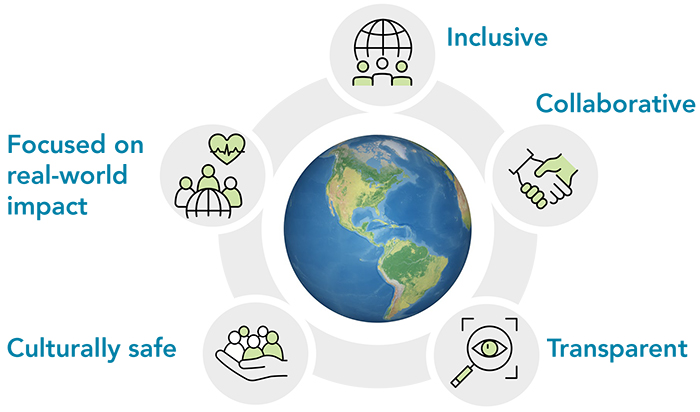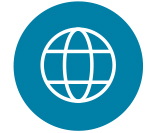CIHR International Research Framework
Greater collaboration, greater health
At the Canadian Institutes of Health Research (CIHR), we know that health research has the power to change lives.
We also recognize that Canada cannot change the world by working alone. That is why CIHR is committed to pursuing and promoting international collaborations. By joining forces with like-minded countries and health research funders, we seek to tackle pressing health challenges while sharing expertise and avoiding duplication.
By working together, we are investing in health research that is improving health outcomes, transforming health systems, and creating a brighter future for all of humanity.
The CIHR International Research Framework outlines our approach to these international collaborations – why we collaborate, the types of partnerships we pursue, and the principles that guide these health research investments.
Canada's vision for international health research
As stated in the CIHR Strategic Plan, our vision is for Canadian health research to be internationally recognized as Inclusive, Collaborative, Transparent, Culturally safe, Focused on real-world impact.

Ultimately, we envision Canada becoming a global leader in harnessing the power of research to improve people's health in Canada and around the world.
Over the past 20 years, CIHR's international collaborations have steadily risen. Currently, CIHR is contributing to 40 international initiatives supported by bilateral and multilateral agreements.
Types of collaborations
CIHR's international collaborations come in several shapes and sizes.
The Global Research Collaboration for Infectious Disease Preparedness (GloPID-R) is an alliance of funders that invest in research on infectious diseases in an effort to increase preparedness and accelerate the research response to outbreaks with pandemic potential.
The International Agency on Cancer Research (IARC) of the World Health Organization (WHO) promotes international research collaborations with a focus on cancer prevention. The Scientific Director at the CIHR Institute of Cancer Research (ICR) represents Canada on the IARC Governing Council.
The National Health and Medical Research Council of Australia, the Health Research Council of New Zealand, and CIHR collaborate on research to address the health burdens experienced by Indigenous Peoples, including diabetes and suicide prevention, as well as strategic initiatives to support emerging researchers of Indigenous ancestry.
Other examples of collaborations include, CIHR's work with the Agency for Medical Research and Development (AMED) in Japan to advance epigenetic technologies, research on diabetes with U.K.'s Medical Research Council, and studying and improving how we fund, practice, evaluate and communicate research with the Research on Research Institute (RoRi).
As a member of the EU Joint Programme – Neurodegenerative Disease Research, Canada has contributed to the world's largest global research initiative on neurodegenerative diseases. In addition, as a member of the Joint Programming Initiative on Antimicrobial Resistance, Canada has supported research to curb antimicrobial resistance with a One Health approach.
CIHR funds leading-edge research on the complex mechanisms of living organisms through the Human Frontier Science Program. Established 30 years ago by Japan, it is now an international research program managed from a central hub in France.
Through the Global Alliance for Chronic Diseases, CIHR and the South African Medical Research Council collaborated to co-fund research projects on the prevention of chronic lung disease. Additionally, CIHR co-funds research projects on primary and secondary prevention of cancer with the Thai Health Systems Research Institute.
The Healthy Life Trajectories Initiative(HeLTI) address the increasing burden of non-communicable diseases (NCDs) around the world. HeLTI uses the Developmental Origins of Health and Disease (DOHaD) approach, which is based on the notion that environmental factors interact with genes during conception, fetal life, infancy and early childhood, and that this programming affects the individual's health later in life.
Objectives
As we look to the future, CIHR will seek to achieve the following objectives through international collaborations:
Build a coordinated and strategic Canadian approach to international collaboration
- Be a broker for partners
- Share information and data
- Promote best practices
Increase equitable participation in priority health research areas
- Focus on research areas of international importance
- Leverage Canadian research strengths
- Develop and promote international partnerships
- Support knowledge mobilization and evidence-based approaches
Create an enabling environment for researchers and trainees to collaborate internationally
- Promote capacity building and international joint training initiatives/events
- Explore mechanisms to integrate capacity building in research initiatives
- Provide seed funding for international collaboration
Provide Canadian leadership in promoting equitable health and science policy
- Promote Canadian values in multilateral research forums (e.g., DORA)
- Contribute to Canada's leadership internationally
- Identify Canadian health experts to participate in international discussions
- Contribute to international dialogues, policies, and research (e.g., G7, G20, WHO, UN)
Guiding principles
CIHR will seek international health research collaborations (both financial and in-kind/nonfinancial) that adhere to the following principles:
- Align with the broader health research community, the CIHR Act and the CIHR Strategic Plan 2021–2031;
- Are influenced and guided by domestic and international priorities and Canadian research expertise and needs;
- Focus on relevance, best value for money, and impact;
- Take into consideration emerging key players and trends in cutting-edge research;
- Reflect lessons learned, including those learned from the COVID-19 pandemic;
- Advance Indigenous self-determination, inclusion, diversity, equity, accessibility, and linguistic duality.
CIHR criteria for international partnerships or collaborations
When collaborating internationally, CIHR will look to establish partnerships that:
Support CIHR and broader government strategies and plans, for example:
Adhere to CIHR and broader government requirements, policies, and positions, for example:
Deliver impact by demonstrating:
- Clear benefit to collaborating internationally
- Advancement of science, policy, innovation, capacity, federal and global targets, health of Canadians, etc.
- Mutual benefit to the research partners
Ensure strong stewardship of resources.
Looking to explore partnership opportunities in international health research?
Please contact the CIHR Strategic Partnerships and International Relations team
- Date modified:







